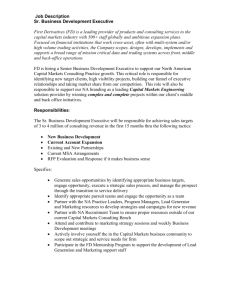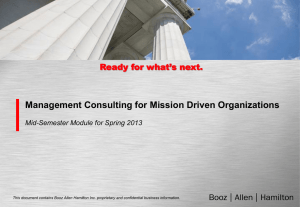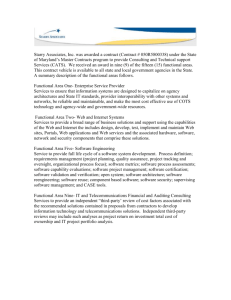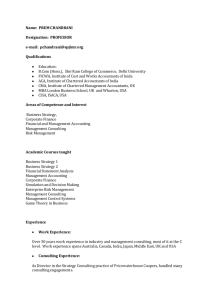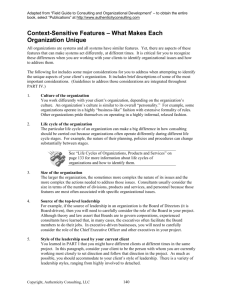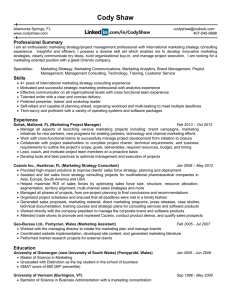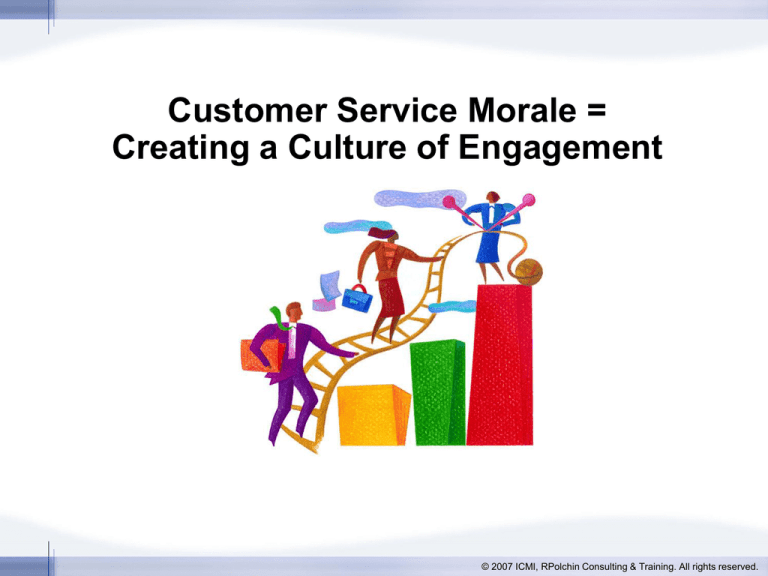
Customer Service Morale =
Creating a Culture of Engagement
© 2007 ICMI, RPolchin Consulting & Training. All rights reserved.
Session Objectives
• Understand what employee engagement is and
the relationship between culture, commitment,
and performance.
• Understand what culture is and its importance in
organizations.
• Learn how to build employee engagement by
motivating your workforce.
© 2007 ICMI, RPolchin Consulting & Training. All rights reserved.
How Many of You Would Like to…
Work in/with an organization where
ALL EMPLOYEES say,
“I LOVE MY JOB!”
???
© 2007 ICMI, RPolchin Consulting & Training. All rights reserved.
Reality Check
What percentage of your employees…
Love their job? _____%
It is OK, do just enough to get by? ____%
Don’t really care much the job? ____%
© 2007 ICMI, RPolchin Consulting & Training. All rights reserved.
The Reality
Current Commitment/Engagement Levels
Actively
Disengaged: 17%
ENGAGEMENT
Do just enough to
get by & get paid: 54%
PERFORMANCE
Love my job,
Engaged 29 %
Source: Gallup Management Journal http://gmj.gallup.com Gallup
Organization Study
© 2007 ICMI, RPolchin Consulting & Training. All rights reserved.
Commitment and Morale Defined
• Commitment: loyalty - devotion or dedication,
e.g. to a cause, person, or relationship.
• Morale: a: the mental and emotional condition
(as of enthusiasm, confidence, or loyalty) of an
individual or group with regard to the function or
tasks at hand b: a sense of common purpose
with respect to a group.
© 2007 ICMI, RPolchin Consulting & Training. All rights reserved.
Engagement Defined
• “Engaged employees are defined as those who
are “mentally and emotionally invested in their
work and in contributing to their employer’s
success.”
• “In a nutshell, engaged employees brings all of
themselves to work.”(JoAnna Brandi, president of
JoAnna Brandi and Co.)
*Excerpt from “Learning’s role in employee engagement” ASTD Research Study sponsored by Dale Carnegie training
** Excerpt from ICMI’s Call Center Management Review , March 2006
© 2007 ICMI, RPolchin Consulting & Training. All rights reserved.
Employee Engagement
The Business Impact of Employee Engagement:
The Corporate Leadership Council has completed a
study of the engagement level of 50,000 employees
around the world. And found that…
Those employees who are most committed
(engaged) perform 20% better and are 87%
less likely to leave the organization.
Source: Corporate Leadership Council
© 2007 ICMI, RPolchin Consulting & Training. All rights reserved.
Organizational Culture Defined
• Organizational DNA
• Culture = Sum of values,
virtues, political environment
and behavioral norms
• In short, is it the “Way We Do
Things Around Here”
What management pays attention to
and rewards is the strongest
indicator of an organization’s culture
© 2007 ICMI, RPolchin Consulting & Training. All rights reserved.
What Is Your Culture?
Think About….
1. What words would you
use to describe your
organization and/or
team?
2. How are decisions
made?
3. How are promotions
determined?
4. What is focused on
more?
5. What gets rewarded?
6. What does the physical
environment look like?
7. How is feedback given?
© 2007 ICMI, RPolchin Consulting & Training. All rights reserved.
Importance of Culture
Direct link
between
culture and
High
Performance
Employee
Engagement
the level of
employee
engagement
Culture
© 2007 ICMI, RPolchin Consulting & Training. All rights reserved.
Levels of Commitment = ENGAGEMENT
Internal
Internalization
Identification
External
Contractual
© 2007 ICMI, RPolchin Consulting & Training. All rights reserved.
Commitment Levels
Internal Commitment
External Commitment
PERFORMANCE
$$$
ENGAGEMENT
© 2007 ICMI, RPolchin Consulting & Training. All rights reserved.
Motivation
“You can’t motivate other people. You can only
influence what they’re motivated to do.”
“People don’t change that much.
Don’t waste time trying to put in what was left out.
Try to draw out what was left in.
That is hard enough.”
Source: First Break All the Rules
© 2007 ICMI, RPolchin Consulting & Training. All rights reserved.
Motivation is…….
“Motivation is a fire from
within. If someone else tries
to light that fire under you,
chances are it will burn very
briefly.”
Dr. Stephen Covey
“Motivation is a function of
growth from getting intrinsic
rewards out of interesting and
challenging work.”
“Motivation is based on growth
needs. It is an internal engine.”
Frederick Herzberg Retrospective Commentary on
1968 HBR article “How Do You
Motivate Employees”
© 2007 ICMI, RPolchin Consulting & Training. All rights reserved.
Motivation Ladder
Sustained Motivation
(Internal Commitment)
Meeting Advanced Needs
Short-term Motivation
(External Commitment)
Price of Admission:
Covering Basic Needs
•The work itself
•Responsibility
•Social interactions
•Achievement
•Recognition
•Growth
•Advancement
•Money
•Prizes
•Awards
•Celebrations
•Competitive pay/benefits
•Job fit
•Working conditions
•Relationship with supervisor
© 2007 ICMI, RPolchin Consulting & Training. All rights reserved.
What Is a High Performing, Motivated
Workforce?
• Greater than 1/3 employees consistently exceed
•
•
•
•
expectations
Average worker performs higher than industry
Strong emotional commitment
Collective performance of major
segments…forms core of competitive advantage
Leaders believe front line people are key to
success and engage employees emotionally and
rationally
Source: Peak Performance, Jon Katzenbach
© 2007 ICMI, RPolchin Consulting & Training. All rights reserved.
“Things that matter to Employees that most
Companies aren’t doing well!”
1. Feeling appreciated for the work they do.
2. Not working in a stressful environment (i.e. call
handling time pressure).
3. Being valued and respected within the center
and organization.
4. Career opportunities for advancement within the
center and organization.
5. The Center effectively utilizes employee’s
knowledge and skills.
Source: SQM Group Study for Manpower
© 2007 ICMI, RPolchin Consulting & Training. All rights reserved.
A Motivation Problem?
As many as 34% of
employees who quit
a job cited a lack or
limited appreciation
of their contributions
as the reason.
Robert Half International
© 2007 ICMI, RPolchin Consulting & Training. All rights reserved.
Gallop Dozen (Q12) Survey
1. Know what is expected of me at work
2. Have everything to do my work
3. Opportunity to do what I do best every day
4. Recognition or praise in last seven days
5. Someone cares about me as a person
6. Development is encouraged
7. My opinions count
8. Mission/purpose makes me feel my job is important
9. Co-workers committed to doing quality work
10. Best friend at work
11. Talked about my progress in last six months
12. Opportunities to learn and grown this year
source: adapted from First Break All The Rules
© 2007 ICMI, RPolchin Consulting & Training. All rights reserved.
A Motivation Problem?
The most powerful
motivation is
_________________
personalized, instant
recognition
_________________
from a manager for a
job well done.
Dr. Gerald Graham, Wichita State University
© 2007 ICMI, RPolchin Consulting & Training. All rights reserved.
Call Center Psychology 101
Achievement and
Recognition
____________________ are
consistently cited as the #1 and #2
primary employee motivators.
Original source: Frederick Herzberg et.al, The Motivation to Work, 1959
© 2007 ICMI, RPolchin Consulting & Training. All rights reserved.
Call Center Psychology 101
Achievement
We aren’t motivated by the
threat of failure; we’re
motivated by the promise of
achievement.
© 2007 ICMI, RPolchin Consulting & Training. All rights reserved.
Call Center Psychology 101
Achievement
The perception
that occurs in a
agent’s mind
that he or she...
...has done
something for the
first time or has
done it better
than ever before.
© 2007 ICMI, RPolchin Consulting & Training. All rights reserved.
Call Center Psychology 101
Recognition
The easiest, most satisfying
& effective way to offer
ongoing recognition to
employees is through
one-on-one feedback.
© 2007 ICMI, RPolchin Consulting & Training. All rights reserved.
Call Center Psychology 101
Recognition
When
someone
achieves
something
and ...
...someone else
recognizes that
accomplishment in
some way
© 2007 ICMI, RPolchin Consulting & Training. All rights reserved.
What Happens in the Center…
• No news is good news, we’ll let you know if
something is wrong
• Negative reinforcement is common
• Attempts at positive reinforcement are
disconnected and remote (financial incentives,
contests, reports)
• Constant redirection & correction
© 2007 ICMI, RPolchin Consulting & Training. All rights reserved.
What Happens in the Center…
No response
No response
Wow! I did it!
I think that’s
how I was
supposed to
do it?
It doesn’t
matter if I do
it or not…
© 2007 ICMI, RPolchin Consulting & Training. All rights reserved.
Call Center Psychology 101
I’m motivated because I just
achieved something. I’d be more
motivated if you would recognize
my achievement, which would
motivate me to go out and
achieve more!
© 2007 ICMI, RPolchin Consulting & Training. All rights reserved.
Call Center Psychology 101
I’m motivated because I just
achieved something. I’d be more
motivated if you would
recognize my achievement,
which would motivate me to go
out and achieve more!
I’ve got to get out my
productivity reports, revise the
schedule because of all the people
who are out, field calls from irate
customers, explain to my boss why
we didn’t achieve our service
level…I’m too busy to coach!
© 2007 ICMI, RPolchin Consulting & Training. All rights reserved.
The Big Question
If we know all this, why
don’t we praise more?
© 2007 ICMI, RPolchin Consulting & Training. All rights reserved.
The Big Question
If we know all this, why don’t we praise more?
1. We don’t have enough time
2. We’re unaware of the power of
verbal praise
3. We have an unrealistic sense of
what achievement means
© 2007 ICMI, RPolchin Consulting & Training. All rights reserved.
The Big Question
3. We have a unrealistic sense of what
achievement means…
Don’t punish people for their
shortcomings, thank them for what
they achieve.
Source: Ferdinand Fournies, Coaching for Improved Work Performance
© 2007 ICMI, RPolchin Consulting & Training. All rights reserved.
Opportunities to Praise
Agents do what they are
supposed to be doing
95% of the time….
__%
© 2007 ICMI, RPolchin Consulting & Training. All rights reserved.
Opportunities to Praise
Agents do what they are
supposed to be doing
95% of the time….
…yet we spend 95% of
our time correcting the
5% of things they are
doing wrong.
© 2007 ICMI, RPolchin Consulting & Training. All rights reserved.
Opportunities to Praise
What do we miss?
•
•
•
•
•
Moves closer toward a goal
Achieves part of an expectation
Meets an expectation
Exceeds an expectation
Exhibits a positive behavior which is not required
© 2007 ICMI, RPolchin Consulting & Training. All rights reserved.
Opportunities to Praise
Don’t
Correct
LESS
Correction
Praise
Common Approach
© 2007 ICMI, RPolchin Consulting & Training. All rights reserved.
Opportunities to Praise
Don’t
Correct
LESS
Correction
Correction
Praise
Praise
Praise
MORE
Common Approach
Positive Approach
© 2007 ICMI, RPolchin Consulting & Training. All rights reserved.
Praise Should Be . . .
•
•
•
•
•
•
Specific
Sincere
Individual
Proportionate
Frequent & ongoing
Encouraging
© 2007 ICMI, RPolchin Consulting & Training. All rights reserved.
Praise Should Be. . .Specific
• Eliminate generic, blanket
praise (e.g., “nice work”)
• Use descriptive language,
quotes, examples
• Describe exactly what was
positive - the behavior, the
result
© 2007 ICMI, RPolchin Consulting & Training. All rights reserved.
Praise Should Be. . . Sincere
• Communicate your concern,
excitement, interest, investment
• Express confidence the agent
can/will succeed
• Convey through word choice, tone
of voice, body language
© 2007 ICMI, RPolchin Consulting & Training. All rights reserved.
Praise Should Be. . . Individual
• A view of the “big picture”
• Continuity between coaching
sessions
• Refer to individual challenges,
struggles, talents, strengths
© 2007 ICMI, RPolchin Consulting & Training. All rights reserved.
Praise Should Be…Proportionate
• Behavior being praised
• Extent to which a goal was achieved
• Importance of the goal
© 2007 ICMI, RPolchin Consulting & Training. All rights reserved.
Praise Should Be. . . Frequent & Ongoing
• Praise customer
communications, adherence,
productivity, special projects,
peer interaction
• Analyze the praise to correction
ratio - consider the 4:1 ratio
• Cultivate the habit
© 2007 ICMI, RPolchin Consulting & Training. All rights reserved.
Praise Should Be. . . Encouraging
• Clarify exactly what you’d like to see happen in
the future
• Provide recognition to inspire reoccurrence
• Stress that the behavior is valued, applauded
© 2007 ICMI, RPolchin Consulting & Training. All rights reserved.
Practical Application
• Practice, Encourage throughout the Center
•
•
•
•
Manager to Reports
Peer to Peer
Across the Call Center
Coach to Agent
Make it part of your weekly To-Do list
Track the type & amount of praise being delivered
Measure the Results
Celebrate!
© 2007 ICMI, RPolchin Consulting & Training. All rights reserved.
Contact Us
International Customer Management Institute (ICMI)
102 South Tejon Street, Suite 102
Colorado Springs, CO 80903
USA
800-672-6177
719-268-0184 fax
icmi@icmi.com
www.icmi.com
© 2007 ICMI, RPolchin Consulting & Training. All rights reserved.



